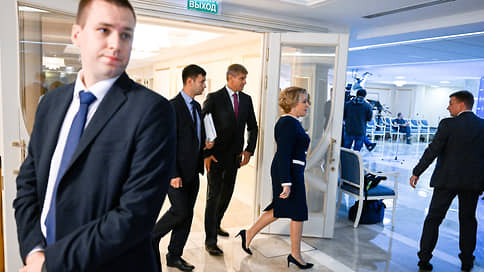Profit centers complete the voyage – Newspaper Kommersant No. 183 (7384) dated 04.10.
[ad_1]

The mechanism proposed by the Ministry of Finance for the smooth abolition of the regime of consolidated taxpayer groups (CGTs) caused a mixed reaction from the regions. At the parliamentary hearings on the budget, dissatisfaction with the compensation mechanism of the transition period was expressed both by the governors of the subjects that lost income due to the CGT regime, and the heads of the regions that lost them due to its abolition. Under these conditions, the head of the RSPP Alexander Shokhin, who represented the interests of the users of the regime – the largest Russian holdings – proposed to keep the mechanism “with modifications”, but in response he heard that this would definitely not be done.
The transitional period proposed by the Ministry of Finance after the abolition of the regime of consolidated taxpayer groups planned for 2023 became one of the main topics of the parliamentary hearings held yesterday in the Federation Council on the draft budget for the next three years. Recall that since 2012, large holdings can carry forward losses for future periods and move them at will between the constituent entities of the Russian Federation, thereby reducing income tax payments or making them more “convenient” for themselves. During this time, 16 TCGs were created in the Russian Federation, which combined into groups the structures of the largest corporations (Gazprom, LUKOIL, Rosneft, X5 Group, Transneft, NLMK, Evraz, Norilsk Nickel and others).
Initially, the CGT regime was conceived for a more even distribution of income tax between regions, so that tax payments would not “sink” in Moscow and St. Petersburg, where the companies are headquartered, but would be distributed across the regions in which companies operate. However, in fact, income tax revenues to the budgets of the subjects decreased as a whole due to this regime. Many governors complained that not only were they losing income, but they were also unable to properly plan their budgets, since holding companies could suddenly “steal” profits to another region. The regime was corrected, but in the end, after long discussions, in 2018 a law was adopted to eliminate it from 2023.
According to the amendments now prepared by the Ministry of Finance as part of the budget package, the abolition of the CGT should become smooth so that the regions that still benefited from this regime would not be immediately deprived of their usual revenues. As Finance Minister Anton Siluanov explained yesterday in the Federation Council, the transition period will last for several years. In 2023, it is planned to consolidate at the federal level 80% of income tax revenues from former CGT participants in order to distribute them among the same regions according to the standards, taking into account actual revenues in previous years. In 2024, we will talk about 60%, in 2025 – 40%. However, the minister added, the Ministry of Finance is ready to continue discussing the compensating mechanism with the regions before the second reading of the budget package.
Such a discussion, apparently, is ahead of the Ministry of Finance: the hearings showed that many regions are in the mood for a discussion. Thus, the governor of St. Petersburg, Alexander Beglov, complained that such a phased abolition of the CGT would lead to a loss of 450 billion rubles from the city budget. in three years. He proposed to refine the transition mechanism. The governor of Karelia, Artur Parfenchikov, on the other hand, said that he had always advocated that the institute of CGP be abolished “in the same way as it was introduced – immediately.” According to him, during the transition period, the region will continue to lose revenues. Since 2012, Karelia has lost 40 billion rubles due to the CGT, during the transition period it will miss another 13 billion rubles. (Anton Siluanov, however, did not agree with these assessments, assuring that there would be “not a minus, but a plus”). “If there is a transitional period, there should be a system that would exclude harm to the budgetary and financial situation in the region,” the governor said.
It should be noted that if the Federation Council promised to listen to the voice of the regions, then the proposals of big business in terms of the CGT were actually rejected. The head of the Russian Union of Industrialists and Entrepreneurs, Alexander Shokhin, proposed “not to stop the CT regime for the time being,” taking into account the complex transitional mechanism, “the effectiveness of which is not obvious,” but to modify it. Thus, the holdings, judging by his words, are ready to limit the offset of losses within the CGT. It was this opportunity that was named as one of the reasons for the decrease in income tax revenues to regional budgets. In response, the speaker of the Federation Council, Valentina Matviyenko, stated that “there will be no return of the CGT”, since the institution “did not justify itself”, thus confirming the government’s position on this issue.
[ad_2]
Source link






